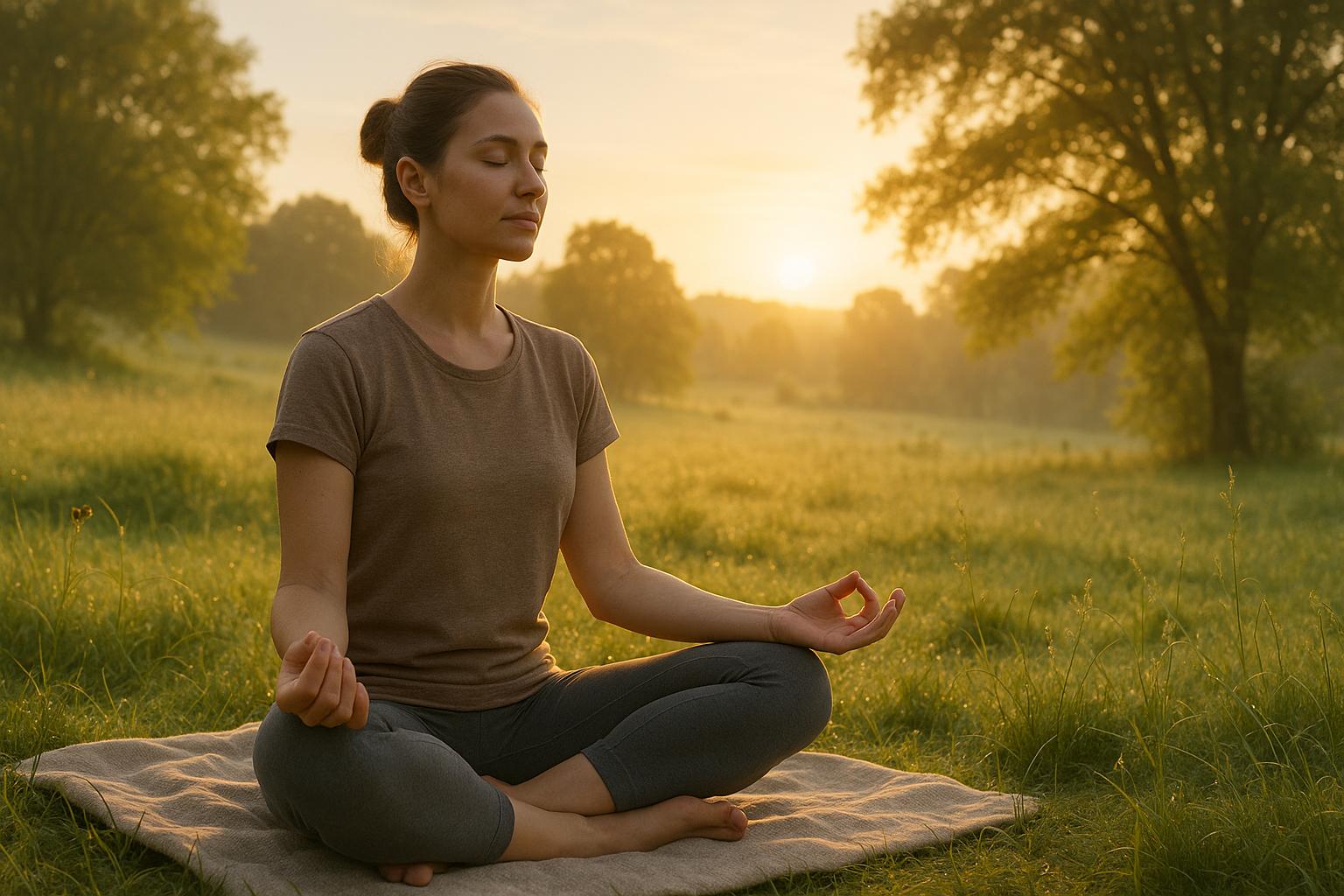In today’s fast-paced world, where stress and overwhelm seem to be constants, taking a step back to breathe and recalibrate can feel like a luxury. Yet, as research and personal experiences increasingly show, intentionally pausing through meditation might just be the secret key to a healthier mind and a more balanced life. This article delves into the transformative potential of meditation, breaking down its benefits, how it works, and practical ways to make it part of your daily routine. Whether you're an experienced meditator or a curious beginner, there's something here for everyone seeking calm amid the chaos.
Why Meditation Is Essential for Mental Health
Life often feels like a whirlwind - constant noise, endless to-do lists, and the weight of personal and professional responsibilities. Meditation offers a counterbalance to these pressures, acting as a mental detox to restore inner peace. Its benefits extend beyond relaxation, delving into the core of emotional resilience and mental well-being.
Stress Reduction
One of the most immediate benefits of meditation is its ability to reduce stress. By calming the mind and relaxing the body, meditation helps lower cortisol levels - the hormone responsible for stress. Regular practice allows individuals to step away from the noise of life, creating a mental space where clarity and calm can thrive.
Emotional Regulation
Meditation enhances mindfulness and self-awareness, empowering practitioners to better understand their emotional triggers. Instead of reacting impulsively, meditation cultivates the ability to pause and respond thoughtfully. "Why am I feeling this way? What’s behind my stress or frustration?" These are questions meditation helps answer by fostering a non-judgmental exploration of our emotions.
Combatting Anxiety, Depression, and PTSD
Research consistently shows that mindfulness meditation can reduce symptoms of anxiety, depression, and even post-traumatic stress disorder (PTSD). For individuals navigating trauma or chronic stress, meditation acts as a grounding tool, offering clarity and emotional stability in the face of life’s challenges.
How Meditation Works to Support Mental Health
Meditation’s profound impact on mental wellness stems from its effects on both the body and the brain. Scientifically, it activates the body’s relaxation system, lowers stress hormones, and promotes better brain function.
- Reduced Cortisol Levels: Meditation decreases cortisol, alleviating the physical symptoms of stress, such as high blood pressure and an increased heart rate.
- Enhanced Brain Function: Studies reveal that regular practice can increase gray matter in the brain, improving areas related to memory, emotional regulation, and self-awareness.
- Better Sleep: Meditation fosters relaxation, making it easier to fall asleep and stay asleep - an essential factor for overall mental health.
By engaging in meditation, you tap into these physiological effects, creating a stronger foundation for mental resilience and emotional balance.
Types of Meditation and Their Unique Benefits
Meditation isn’t a one-size-fits-all practice. Different techniques cater to different needs, making it accessible to everyone, regardless of experience or preference.
1. Mindfulness Meditation
Mindfulness meditation involves focusing on your breath, thoughts, and emotions without judgment. The goal is to be present, recognizing and accepting your current state rather than dwelling on the past or worrying about the future. This practice builds awareness and promotes emotional acceptance, a key step toward achieving inner peace.
2. Loving-Kindness Meditation
Also known as "metta" meditation, this technique centers on sending love and compassion to yourself and others. It’s particularly effective for improving self-esteem, fostering forgiveness, and cultivating a sense of emotional connection with others.
3. Guided Meditation
Perfect for beginners or those who prefer structure, guided meditation involves following the directions of an instructor or a recorded session. These sessions often focus on specific outcomes, such as relaxation, stress relief, or improved focus, making it easier for newcomers to establish a routine.
4. Body Scan Meditation
This practice involves mentally scanning your body from head to toe, observing sensations or areas of tension. Body scans enhance relaxation and help you reconnect with your physical self, making it an excellent antidote to stress.
By experimenting with different techniques, you can discover which type of meditation resonates most with your needs, allowing you to tailor your practice for maximum benefit.
Real-Life Benefits of Meditation
Meditation doesn’t just promise abstract benefits - it delivers tangible results that can transform your day-to-day life. Here are some practical ways it enhances mental and emotional well-being:
- Stress Reduction: Meditation reduces the physical and psychological signs of stress, such as high blood pressure and muscle tension.
- Improved Mood: Regular practice elevates emotional well-being, fostering a sense of happiness and contentment.
- Increased Emotional Resilience: Meditation equips you with tools to navigate setbacks and challenges, making it easier to bounce back from life’s difficulties.
- Enhanced Focus and Clarity: By training the mind to stay present, meditation sharpens concentration and improves decision-making.
By incorporating meditation into your life, you equip yourself with a toolkit for navigating the ups and downs of daily life with greater ease and emotional balance.
How to Start Your Own Meditation Practice
Starting a meditation practice might feel daunting, but it’s simpler than you think. Here’s how to ease into it:
1. Start Small
Begin with just 5–10 minutes a day. Set aside this time to focus on your breathing or listen to a guided meditation. Starting small reduces the pressure to "get it right" and helps you build consistency.
2. Be Consistent
Find a time that works for you, whether it’s first thing in the morning or at the end of the day. By making meditation a regular part of your routine, you’re more likely to experience its long-term benefits.
3. Create a Calm Space
Choose a quiet place where you won’t be easily distracted. This could be a corner of your room, a peaceful spot outdoors, or anywhere you feel comfortable and safe.
4. Embrace Imperfection
Meditation isn’t about perfection. If your mind wanders, gently guide it back to your breath or focus. Remember, the journey is as important as the destination.
5. Explore Different Techniques
Experiment with various meditation styles to find what resonates with you. Whether it’s mindfulness, loving-kindness, or guided meditation, the most important thing is to find a practice that feels natural and enjoyable.
Key Takeaways
- Meditation is a transformative tool for reducing stress, improving emotional resilience, and fostering mental clarity.
- Regular practice can alleviate symptoms of anxiety, depression, and PTSD while promoting better sleep and focus.
- Different meditation techniques, such as mindfulness or loving-kindness, cater to various needs and preferences.
- Start small, be consistent, and create a calm space to establish a sustainable meditation habit.
- Meditation isn’t about perfection - it’s a process that encourages self-compassion and growth over time.
By incorporating meditation into your routine, you’re not just improving your mental health - you’re cultivating a deeper connection to yourself and the world around you.
Conclusion
Meditation is more than a wellness trend; it’s a time-tested practice grounded in science and human experience. By dedicating a few moments each day to mindfulness, you can unlock a more peaceful, resilient, and fulfilled version of yourself. Remember, the journey toward mental wellness starts with a single breath - so take yours today.
Source: "The Life Changing Benefits of Meditation for Mental Health" - Thriving Talks, YouTube, Aug 28, 2025 - https://www.youtube.com/watch?v=J6p0iRE-2ds
Use: Embedded for reference. Brief quotes used for commentary/review.






